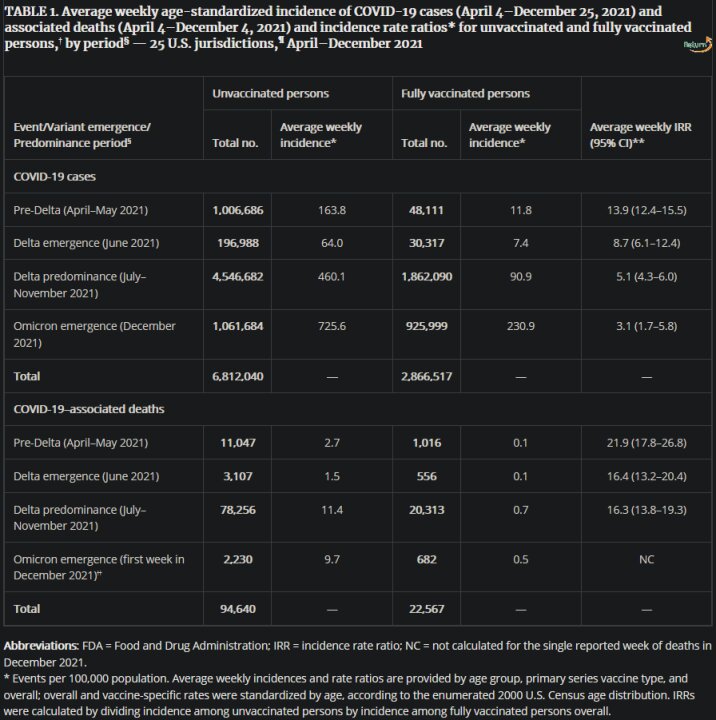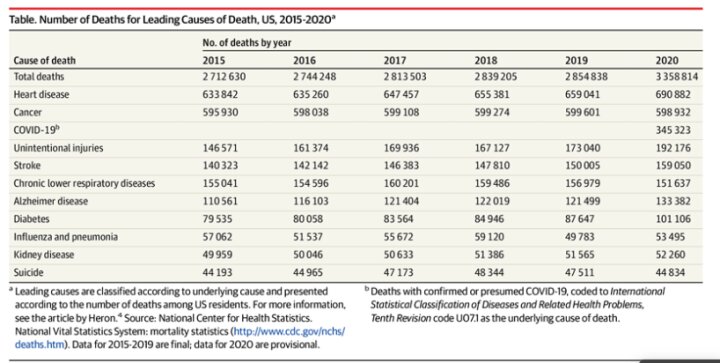@hippyjoe1955 says
The all cause death rate is up significantly since the introduction of the vax.
Could be. Problem is, the all cause death rate doesn't distinguish between the vaxxed and the anti-vaxxers. What do we find when we compare these two categories? Read on and find out!!!
Executive Summary:In 2021, the 75% of Americans fully vaccinated produced under 20% of the Covid deaths, while the 25% unvaccinated Americans produced over 80% of the Covid deaths.
In 2021, the 75% of Americans fully vaccinated produced under 31% of Covid cases; while the 25% unvaccinated Americans produced nearly 70% of Covid cases.
This means the US unvaccinated had a 5X higher chance of contracting Covid compared to the vaccinated per capita, and that overall the unvaccinated had about a 15X higher probability of Covid death per capita.
Note: since 'Long Covid' occurs in 15% to 25% of Covid cases, that means there is also a 5X higher prevalence of Long Covid per capita among the unvaccinated.
DetailsSource
https://www.cdc.gov/mmwr/volumes/71/wr/mm7104e2.htmis a CDC analysis of 25 geographically dispersed US jurisdictions. It presents statistics on Covid incidence and death rates broken up by "wave" (dates) and age, separately for vaccinated and unvaccinated. Most of the key data is in TABLE 1.
https://www.cdc.gov/mmwr/volumes/71/wr/mm7104e2.htmDiscussionNote that the period is Apr-Dec 2021; why? In the first quarter of 2021 we were busily vaccinating the 65+ cohort; the most vulnerable. There was an excess of unvaccinated deaths in that period and not enough vaccinated people to make a fair comparison. Including that timeperiod would skew the data to make vaccines look even better than they are.
Note that the total deaths add up to 117,207, while the total 2021 US Covid death toll was about 550,000. That is because this data is for 25 representative jurisdictions, not the whole nation. This data represents over a quarter of US deaths, so percentages from it are statistically representative of the overall US Covid situation.
Vaccine effectiveness (VE) declined from the pre-delta to the delta to the omicron waves, but vaccines still provided significant protection.
The age-standardized IRR for cases in unvaccinated versus fully vaccinated persons was 13.9 during April–May and progressively declined to 8.7 during June, 5.1 during July–November, and 3.1 during December, coinciding with the periods of Delta emergence, Delta predominance, and Omicron emergence, respectively. This decline suggests a change in crude VE for infection from 93% during April–May, to 89% during June, 80% during July–November, and to 68% during December. Age-standardized IRRs for deaths among unvaccinated versus fully vaccinated persons were relatively stable; crude VE for deaths was 95% during April–May, 94% during June, and 94% during July–November.
Booster doses were highly effective.
During October–November, age-standardized IRRs for deaths among unvaccinated persons were 53.2 compared with those in fully vaccinated persons with a booster dose and 12.7 compared with persons without a booster dose; these results represented crude VE against death of 98% and 92%, respectively.
Incidence rate ratios
IRRs were calculated by dividing incidence among unvaccinated persons by incidence among fully vaccinated persons (overall and by receipt of booster doses); after detrending the underlying linear changes in incidence













